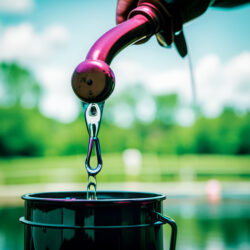Seeking Justice: Camp Lejeune Water Lawsuits for New York Residents
The Camp Lejeune water contamination incident, a haunting chapter in North Carolina's history, has far-reaching implications for New York residents.

This article elucidates the legal rights of those affected, the provisions under the Camp Lejeune Justice Act, and the process of filing a lawsuit in New York.
It underscores the importance of legal assistance and explores the journey to compensation, sharing victims' experiences and speculating on the future of such lawsuits.
Key Takeaways
- Contaminated drinking water at Camp Lejeune put hundreds of thousands of people at risk for cancer and other serious illnesses.
- New York veterans and families who lived at Camp Lejeune may have been exposed to this dangerous drinking water.
- The Camp Lejeune Justice Act enables New York families harmed by Camp Lejeune water contamination to file a claim for the first time.
- Filing a Camp Lejeune water contamination lawsuit is the only means New York individuals and families have to obtain the compensation they deserve.
The Impact of Camp Lejeune Water Contamination
The contamination of drinking water at Camp Lejeune has had severe health implications for hundreds of thousands of people. Fifteen different illnesses and medical conditions, including various forms of cancer, have been linked to the exposure. The impact of Camp Lejeune water contamination on health has been profound and far-reaching, affecting both military personnel and their families.
The long-term consequences of Camp Lejeune water contamination include the development of debilitating health conditions. Many of these conditions have life-altering and potentially fatal outcomes. Examples of these conditions include kidney cancer, liver cancer, non-Hodgkin's lymphoma, and Parkinson's disease, among others.
In addition to these serious health conditions, there has been a significant increase in the prevalence of birth defects among children born to parents exposed to the contaminated water. The extent of the health implications is still being investigated.
Legal Rights for New York Residents Affected by Camp Lejeune Water Contamination
Legal rights for individuals affected by water contamination incidents have been firmly established through the Camp Lejeune Justice Act, providing a pathway for compensation claims. This legislation has been instrumental in facilitating access to rights and compensation for New York residents impacted by the Camp Lejeune water contamination incident.
- The Act stipulates the legal process and requirements for filing compensation claims.
- Plaintiffs must demonstrate that they lived or worked at Camp Lejeune for at least 30 days between 1953 and 1987.
- They must also provide medical evidence linking their health condition to the water contamination.
- The Act enables claimants to file lawsuits against the U.S. Government, overcoming previous legal barriers.
- Compensation under the Act covers medical expenses, loss of income, pain and suffering, and in some cases, punitive damages.
Understanding the Camp Lejeune Justice Act
Understanding the complexities of the Justice Act requires an in-depth exploration of its provisions, implications, and the rights it confers to those affected by contaminated water incidents.
This Act allows New York residents, who experienced health complications due to Camp Lejeune water contamination, to file lawsuits. The legal process commences with the filing of a claim against the U.S. Government, which may necessitate the assistance of legal professionals experienced in such matters.
The Act's enactment not only acknowledges the health impact of the contamination on New York residents but also provides a legal pathway for them to seek compensation. Despite receiving benefits from the Veterans Affairs, affected individuals can still initiate a claim under the Camp Lejeune Justice Act, broadening the scope of potential redress.
Claim Eligibility for New York Veterans and Families
Eligibility for filing a claim under the designated Act extends to veterans and their families who resided or worked in the affected area for a minimum of 30 days between 1953 and 1987. The eligibility criteria include exposure to contaminated water at Camp Lejeune during the specified timeframe and a diagnosis of one or more of the specified illnesses or conditions linked to the water contamination.
The available compensation depends on a variety of factors, including the severity and prognosis of the illness, related medical expenses, and potential loss of income due to disability or reduced working capacity.
While the process can be complex, it is crucial for affected individuals to understand their rights and the compensation potentially available to them under the Act.
The Process of Filing a Camp Lejeune Water Contamination Lawsuit in New York
Filing a lawsuit related to water contamination requires a thorough process, which involves gathering of substantial evidence, enlisting professional legal assistance, and adhering to specific timelines. The filing process is crucial to ensure compensation eligibility. Understanding the steps involved in the lawsuit filing process and the criteria for compensation eligibility is essential.
The following table provides an overview of the steps involved:
| Steps in Filing Process | Description | Importance |
|---|---|---|
| Evidence Gathering | Collection of medical records, exposure proof | Validates the claim |
| Legal Assistance | Enlisting professional help | Guides through legal procedures |
| Timelines Adherence | Meeting all deadlines | Prevents dismissal of case |
The Role of Lawyers in Camp Lejeune Water Contamination Lawsuits
In the realm of legal battles pertaining to water contamination, attorneys play a pivotal role by providing guidance through the complex litigation process, advocating on behalf of their clients, and striving to secure rightful compensation for the harm suffered. This role becomes particularly significant in the context of Camp Lejeune water contamination lawsuits.
- Lawyers offer their expertise in navigating the intricate legal procedures involved in these lawsuits.
- They assist in gathering necessary evidence.
- They ensure that legal deadlines are met.
- They represent their clients' interests in negotiation or trial.
Moreover, the advocacy of lawyers has a profound impact on the legal rights of New York residents affected by Camp Lejeune water contamination, empowering them to seek justice and compensation for the harm inflicted upon them.
The Importance of Seeking Legal Help for Camp Lejeune Water Contamination Claims
Moving from the role of lawyers in Camp Lejeune water contamination lawsuits, the importance of seeking legal representation becomes apparent. The complex nature of these cases necessitates the guidance of legal experts well-versed in environmental law and personal injury claims. Furthermore, understanding the compensation process is vital for plaintiffs seeking redress for their injuries. The incorporation of a legal representative increases the chances of a successful claim, as they are familiar with the nuances of the law and can navigate the complexities of such cases.
| Seeking Legal Representation | Understanding Compensation Process |
|---|---|
| Expert guidance in legal proceedings | Insight into how compensation is calculated |
| Increased chances of a successful claim | Clear explanation of the steps involved |
| Assistance in collection and presentation of evidence | Guidance on what to expect during the process |
The Journey Towards Compensation for Victims of Camp Lejeune Water Contamination
The path towards obtaining compensation for individuals affected by water contamination involves multiple stages, each necessitating careful navigation and precise documentation. The journey, fraught with compensation challenges, can be intimidating to navigate without the necessary legal process details.
- Legal Proceedings:
- Initiation: Filing a claim under the Camp Lejeune Justice Act.
- Discovery: Gathering and presenting evidence of exposure and illness.
- Resolution: Either by settlement or trial verdict.
Compensation Challenges:
- Proving causation: Linking the exposure to the diagnosed illness.
- Time limitations: Adhering to the stipulated statute of limitations.
Legal Process Details:
- On a contingency basis: No legal fees unless compensation is won.
- Multi-District Litigation: Consolidates individual lawsuits, ensuring individual evaluation and compensation.
This process, while complex, is crucial for victims seeking justice.
Fighting for Justice: Camp Lejeune Water Contamination Victims’ Stories
Personal accounts from victims of the contamination crisis provide a poignant illustration of the struggle for recognition and compensation. Camp Lejeune water contamination victims' personal stories reveal the severe impact of toxic chemicals on residents. These accounts disclose numerous health complications, including various cancers and serious illnesses, directly linked to the contaminated water sources.
The struggle for justice involves pursuing recognition of the damage caused by the contamination and seeking adequate compensation. The delay in revealing the true extent of the contamination and its impact has further exacerbated the suffering of victims. Despite the painful ordeal, these personal stories highlight resilience and determination, which have been instrumental in initiating legislative changes, such as the Camp Lejeune Justice Act, aimed at securing compensation for affected victims.
The Future of Camp Lejeune Water Contamination Lawsuits in New York
Future litigation concerning contamination at a certain marine corps base is likely to evolve in the state known for its Big Apple, as laws and public awareness continue to change. The potential impact of Camp Lejeune water contamination lawsuits in New York could be significant.
- Impact on Public Health:
Increased awareness of contamination risks.
Increased demand for medical services and surveillance. - Impact on Legal Landscape:
Changes in statutes of limitations.
Increased litigation and potential for large settlements. - Role of Government Agencies:
Greater scrutiny and regulation of water sources.
Enhanced efforts to address past contamination incidents.
The role of government agencies in addressing Camp Lejeune water contamination in New York is crucial, as is ongoing vigilance from public health advocates and legal professionals.
Frequently Asked Questions
How Long Does a Typical Camp Lejeune Water Contamination Lawsuit Process Take in New York?
The duration of Camp Lejeune water contamination lawsuits in New York varies, influenced by factors such as legal representation options and the impact of the statute of limitations. Each case is subject to individual circumstances.
How Can a New York Resident Prove That Their Illness Is Directly Linked to the Water Contamination at Camp Lejeune?
Establishing a direct link between illness and Camp Lejeune's water contamination necessitates two key elements: Contaminant Identification in the victim's system and comprehensive Medical Documentation delineating the progression of the disease post-exposure.
If a Veteran or Family Member Has Passed Away Due to an Illness Linked to the Water Contamination, Can Their Family Still File a Lawsuit in New York?
In instances of mortality linked to water contamination illnesses, families retain eligibility for compensation. The claim process allows them to file a lawsuit in New York on behalf of the deceased veteran or family member.
Are There Any Exceptions to the 30-Day Minimum Stay Requirement at Camp Lejeune for Filing a Lawsuit in New York?
Exceptions to the 30-day minimum stay requirement for filing a Camp Lejeune lawsuit in New York are subject to statute limitations and may necessitate specialized legal representation to navigate these complex provisions.
If a New York Resident Lived at Camp Lejeune but Was Not Directly Serviced by the Hadna Point and Tarawa Terrace Water Distribution Systems, Can They Still File a Lawsuit?
Eligibility for legal representation in Camp Lejeune water lawsuits hinges on exposure to contaminated water, not specific distribution systems. Therefore, New York residents residing at the base during the contamination timeline may still file a lawsuit.

This post has been generated by AI and was not reviewed by editors. This is Not legal advice. Please consult with an attorney.




